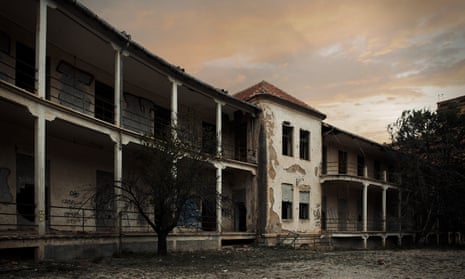 |
| Torres’s book is set in a desiccating mansion in a nameless border town. Photograph: Merche Portu |
Blackouts by Justin Torres review – a queer-gothic dreamworld
A marginalised history is salvaged from real‑life medical records in this strange and glorious novel
Beejay Silcox
Thursday 9 November 2023
I
My review notes are full of these pop-cultural thought experiments: imagine Scheherazade plucking her stories from the Kinsey Report; Kiss of the Spider Woman restaged in a psychiatric hospital; the Old Testament rewritten by Tennessee Williams. Blackouts is both a tale and a product of queer inheritance. It is a book that honours its ghosts.
The most insistent spectre in Torres’s novel is Jan Gay, AKA Helen Reitman (1902-1960), the pioneering queer sociologist (“specimen and expert both”). In the 1920s and 30s, Gay conducted hundreds of interviews in the hope of demystifying and normalising queer desire. But to publish her work she needed the imprimatur of a physician, some redoubtable white-coated gent. The result was the landmark report Sex Variants: A Study of Homosexual Patterns (1941), in which Gay’s work was hijacked and pathologised by a team of American doctors – testimonies twisted into diagnoses. But the report also preserved dozens of her interviews, a rare and precious record of queer life in the golden age of eugenics.
In Torres’s novel, a heavily redacted copy of Sex Variants has found its way into the Palace, a desiccating mansion in a nameless border town. In a previous life the Palace may have been a hotel or “stately asylum”. Now it seems to function as a cut-price hospice, or perhaps something a little more purgatorial: the ultimate halfway house. Time moves strangely in its halls, as if “everything here is permanently set to some languorous tempo”.
Long-term resident Juan Gay has spent his days immersed in the blacked-out report, piecing together Jan’s story, and – through her – his own (their shared surname is no accident). But there is only one way to leave the Palace, and Juan’s terminal ride is waiting. It’s time for him to place the project into new hands.
Enter our narrator, a young man we will know only as Nene, the pet name Juan uses for him. Unmoored and broke, Nene has spent the last of his crumpled dollars on a bus fare so he might tend to Juan (“The truth is I had nowhere else to go, and both of us knew as much”). The friends strike a deathbed bargain: Nene will continue Juan’s work in exchange for his room at the Palace.
Blackouts is largely confined to that room. At times it feels like a confessional booth; at others, a therapist’s office or sociology classroom. But it always feels like a metaphor. Underneath the decades of flaking paint, a garish circus cavorts across the wallpaper – a frieze of tamed lions and clowns with rictus grins.
At night, the men trade stories in the heat-sodden dark, keeping death at bay one long hour at a time. During the day, as Juan sleeps and fades, Nene pores over the report, trying to make sense of its erasures. “I thought maybe they were redactions made by some state functionary, until I noticed the precision and painstaking effort, the obsessive care went beyond mere censorship.”
In the hands of a bureaucrat, a black marker is a weapon: a silencer. But it can also be a tool of revelation. So it is here. Torres includes “extracts” from Nene’s copy of the report throughout his novel. Scrubbed free of pseudo-scientific gibberish, Jan Gay’s subjects re-emerge. They are depathologised, humanised – their yearnings unshackled.
Blackouts arrives a dozen years after Torres’s much-loved debut, We the Animals, a semi-autobiographical tale of the wild and clamorous hungers of three young brothers. That book had its teeth bared: it was raucous, linear and determinedly realist. Blackouts is a very different animal. It slips in the door like some soft-footed night creature: paratextual, meta-fictional, multimedia, form-slippery.
They make for beautiful counterweights – the snarling debut, the slinking follow-up. For the reader, the deep anguish of We the Animals came in watching the brothers’ ferocious intimacy disintegrate under the weight of social shame. It was a portrait of queer ostracism – the forces of unbelonging. The deep joy of Blackouts is the converse. Juan’s bargain with Nene is not a trap, it’s an invitation to write himself into a boundless story: “I was missing out on something grand,” Nene reflects, “a subversive, variant culture; an inheritance.”
Queer history survives in hushed and hidden places: the omissions, the subtext. It is salvaged from footnotes and appendices; patched together from uncatalogued scraps; traced in silhouette; extracted from shameful lies; whispered down the generations. Torres’s novel is a hymn to this resilience, but it is also a celebration of that most transitory and fallible of archives: the body.
Blackouts revels in the grotesque, impossible beauty of human rot. It is a novel of mercies and indignities; bruises and bones; the ever-tangled eroticism of life and death. “From a certain distance, the catastrophic must be indistinguishable from the sublime,” Torres writes. That is what he has managed in this glorious book – to hold us at precisely the right distance.
Blackouts by Justin Torres is published by Granta (£14.99).


No comments:
Post a Comment